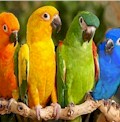At the same you are getting less and less sleep, your pet parrot is getting ornery and difficult to handle. Where he was once a happy camper, now your parrot is getting downright surly. You and your pet parrot are both suffering from the same problem. Not enough sleep.
The drive home was long and tiring. Arriving home you see that there are some chores to do, the kids need your attention and the boss has given you some homework. Exhausted, you notice the hour is late and if you are lucky, you might catch five or six hours of sleep. Waking the next morning you still feel tired, out of sorts and cranky.
Even the weekend brings no relief with a busy schedule of household chores and family events. It will not be long before your sleep deficient grows to the point you are always tired and in a perpetually bad mood.
During the course of the average day, we humans are bombarded by visual stimuli. Messages from television, radio, cell phones and all manner of electronic gadgetry fill our senses. Artificial lighting and seasonal changes in natural light has a profound affect on many of us. The effects of this sensory overload are well documented in both humans and animals. Not surprisingly, your pet parrot can be adversely affected by lighting and noise. Things that the average human may take for granted, might pose a problem for the average parrot, or other per bird. With a possible lifespan of over seventy years, there are certain behaviors that are deeply engrained and one is the need for sleep.
Owning a pet of any kind brings with it tremendous responsibilities. Beyond providing the basic like food water and shelter, certain animals, especially exotic pets need special attention. Depending on the species, animals, including parrots have specials needs to which humans must adapt. Think of it as a kind of reverse adaptation. Parrots in the wild live in an environment vastly different from their homebound cousins. The fact is that all parrots are wild animals and are not domesticated like dogs, cats and other types of house pets.
Your schedule and living habits may include watching late night television or leaving the lights on until you go to bed. Like humans, parrots need a certain amount of sleep. Restful sleep helps the mind refresh itself. Sleep is important to help us recuperate from the stress of the day. The same is true for parrots and other pet birds. In order to ensure that your pet is getting recuperative sleep, there are certain adaptations that you may need to make.
Pet birds are completely dependant on us for their care. Therefore, it is up to the owner of the bird to provide a proper environment that is right for the bird. Since your pet parrot may not like late night television, you may need to move the television, or the bird, to another room.
Reducing the amount of artificial light is another key to providing the bird a proper habitat. In the wild, many bird species, including parrots, will rest and sleep starting around dusk. That is far earlier than most human decide to hit the proverbial hay.
One way to reduce the birds over exposure to artificial light is to tent the birds cage or perch. These types of products are widely available through pet retailers. Keeping the noise down is another very important environmental consideration.
Allowing your bird to get a good recuperative sleep will improve his mood. Parrots are very intelligent animals and can provide us with many years of loyal companionship. It is up to us to provide everything these beauty animals need when we make them part of home and our lives.
